Dasapushpam – Divine Power Of Ten Sacred Herbs – Dasa-Pushpam
Dasapushpam in Karkkidakam -Ten Sacred Herbs
Dasapushpam means a group of 10 flowers. We use leaves of most of these plants also.Dasapushpam constitutes a group of ten potential herbs which are culturally and medicinally significant to the people of Kerala in India. They are a group of ten herbs with which the ladies decorate their hairs and dance the Thiruvathira Kali on the day of Thiruvathira in the Malayalam month of Dhanu. Pathiraapoochudal ritual on thiruvathira in Dhanu, important ceremonies like marriage and for pithrukarma.
വീടുകളിൽ പഴയ തലമുറക്കാർ ദശപുഷ്പം നട്ടുവളർത്തിയിരുന്നു. പ്രത്യേക പരിചരണം വേണ്ടാത്തവയാണ് ഇവയെല്ലാം. ആയുർവേദ കൂട്ടുകളിലും ഒറ്റമൂലികളായും അറിയപ്പെട്ടിരുന്ന ഇവയെല്ലാം ഇന്ന് അപ്രത്യക്ഷമായി.
The divine power of Dasapushpam
Dasapushpam is a group or a mixture of ten sacred flowers,herbs having many curative properties. The herbs are used effectively in home remedies because of their medicinal properties and their ability to cure in a natural way. Women of Kerala wear these herbs on the month of Karkidaka as it is said to benefit their health
Karkidaka kanji churnam Navara rice buy online from natureloc.com
A detailed description Dasapushpam ten sacred flowers,herbs
Karuka (Cyndon dactylon) Bermuda Grass
Dasapushpam – Karuka or Durva (in Sanskrit) is widely used for Ganapathy pooja. For children with problems in childhood in their horoscope, Karuka Homa is the sure shot cure for the Balarishta yoga in the horoscope. Karuka is not used for Durga pooja. It is considered a very invasive and competitive weed. Few herbicides are effective against it. Before mechanised farm machinery, it was the farmer’s worst weed. However, back then it saved thousands of acres of farm soil from erosion. It was the most widely grown pasture and turf grass in the South. Bermuda grass is highly nutritional for cattle and can be fed to sheep.
Mukkutti (Biophytum sensitivum) Little Tree Plant
Mukkutti or Viparitalajjalu (in Sanskrit) is a very small flowering plant. Each plant produces five to ten small flowers with yellow petals. Mukkutti is an important flower for the people of Kerala. The flower is used in athapoo, special floral formation that adores courtyards and public places during Onam, the national festival of Kerala. Mukkutti flowers and plants are used for making garlands in Ganapathy temples.
Mukkutty pushpanjali is an important offering in Malliyoor Mahaganapathy temple. Mukkutty is also used for making mukkutty chanthu during Thiruvathira festival. Biophytum sensitivum is a traditional oriental herbal medicine that is known for its immune-stimulatory and antitumor effects. Tumour metastasis is the most important cause of cancer death. Although B. sensitivum was shown to inhibit metastasis, the mechanism
underlying this action is not well understood
The herb is known to pacify Kapha and pitta. It is used to treat conditions like arthritis, sprain, stiff neck etc. It is one of the herbs which is given to women after delivery because of its ability to clean the uterus .It is also used in cases of heavy bleeding in women. A paste made of the leaves mixed with butter milk is used in cases of diarrhoea. The whole plant is crushed and the juice mixed with honey is administered in cases of cough and chest congestion.
Nilappana (Curculigo orchioides) Golden Eye-grass
Dasapushpam Kali Musli (in Hindi) grows as Forest herb. Since generations, it is in use as folk medicine. In many parts of India, due to it’s over-exploitation, It is becoming rare in occurrence. According to Ayurveda, root is heating, aphrodisiac, alternative, appetiser, fattening and useful in treatment of piles, biliousness, fatigue, blood-related disorders etc. According to Unani system of medicine, root is carminative, tonic, aphrodisiac, antipyretic and useful in bronchitis, ophthalmic,indigestion, vomiting, diarrhoea, lumbago, gonorrhoea, gleets, hydrophobia, joint pains etc.
Uzhinja (Cardiospermum halicacabum) Balloon plant
It is used in treating earaches and in relieving swellings. The juice is also used in curing minor wounds. The juice is said to reduce obesity. The herb is also used in hair oil preparations to reduce dandruff and for darkening the hair. The herb also has laxative properties.
It is a climbing plant widely distributed in tropical and subtropical Africa and Asia. Often found as a weed along roads and rivers. Leaves are mixed in castor oil to treat stiff limbs,rheumatism and lumbago. Root has diaphoretic, diuretic and laxative properties. Leaf juice is used for earache. It is used in the treatment of rheumatism, nervous diseases, stiffness of the
limbs and snakebite. A tea made from them is used in the treatment of itchy skin. Salted leaves are used as a poultice on swellings. The leaf juice has been used as a treatment for earache. The root is occasionally used in the treatment
Aerva lanata, belonging to Amaranthaceae family is a common weed which grows wild everywhere in plains of India. The root has camphor like aroma. The dried flowers which look like soft spikes are sold under the commercial name as Buikallan or Boor. Decoction of the flowers is said to cure stones in any part of the stomach and that of the root is diuretic and cure
for kidney stones.
Thiruthali (Ipomea maxima) Morning glory
Morning glories are usually perennial plants; however, some species which grow in colder climates may be annual plants. In general, morning glories are ornamental vines, with heartshaped leaves and an array of delicate, colorful flowers in blue, purple, pink or white.
Muyal Cheviyan (Emilia sonchifolia) Lilac tassel flower
Emilia sonchifolia is an annual growing to 0.6 m (2ft). It is hardy to zone 9 and is frost tender. It is in flower from Jul to October, and the seeds ripen from Aug to October. The flowersare hermaphrodite (have both male and female organs) and are pollinated by Insects. The plant is self-fertile. A tea made from the leaves is used in the treatment of dysentery. The juice of the leaves is used in treating eye inflammations, night blindness, cuts and wounds and sore ears.
The plant is astringent, depurative, diuretic, expectorant, febrifuge and sudorific. It is used in the treatment of infantile tympanites and bowel complaints. The juice of the root is used in the treatment of diarrhea. The flower heads are chewed and kept in the mouth for about 10 minutes to protect teeth from decay.
Kayyonni or Kanhunni (Eclipta alba) False Daisy
In ayurvedic medicine, the leaf extract is considered a powerful liver tonic, rejuvenative and especially good for the hair. A black dye obtained from Eclipta prostrata is used for dyeing hair and tattooing. Eclipta prostrata also has traditional external uses, such as for athlete’s foot, eczema and dermatitis, and on the scalp to address hair loss; the leaves have been used in the treatment of scorpion stings. It is used as anti-venom against snakebite in China and Brazil. It is reported to improve hair growth and color.
Nilappana (Curculigo orchioides) Golden Eye-grass
Kali Musli (in Hindi) grows as Forest herb. Since generations, it is in use as folk medicine. In many parts of India, due to it’s over exploitation, It is becoming rare in occurrence. According to Ayurveda, root is heating, aphrodisiac, alternative, appetizer, fattening and useful in treatment of piles, biliousness, fatigue, blood related disorders etc. According to Unani system of medicine, root is carminative, tonic, aphrodisiac, antipyretic and useful in bronchitis, ophthalmic,indigestion, vomiting, diarrhea, lumbago, gonorrhea, gleets, hydrophobia, joint pains etc.
Poovamkurunthal (Vernonia cinerea) Little Ironweed or Purple Fleabane
Every part of the plant can be used medicinally. This herb has been used to treat a number of disorders including inflammation, malaria, fever, worms, pain, dieresis, cancer, abortion, and various gastro-intestinal disorders. The juice of the plant is given to children with urinary incontinence. The leaves are eaten as a potherb. A decoction of it is also given in diarrhea, stomachache and for cough and colic.
Vishnukranthi or Krishnakranthi (Evolvulus alsinoidus) Dwarf Morning glory
The whole plant is used for medicinal purpose, externally; the medicated oil of the herb is useful as a hair tonic, to promote the hair growth. Its paste is also applied externally in skin diseases. Sankhapushpi (sanskit name) hair oil prevents the premature graying and failing of hair. Internally, the plant is used in vast range of diseases. The whole plant juice is traditionally used in various mental disorders. As one of the best psychotropic drugs, it was held in high esteem by the ancient sages of India. In minor memory disturbances, nervous debility and amentia it is widely used as a brain tonic
Dasa pushpam – ten sacred herbs crushed dried buy Online from NatureLoc.com


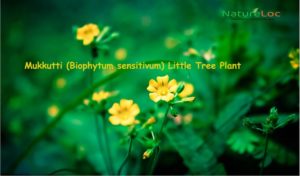

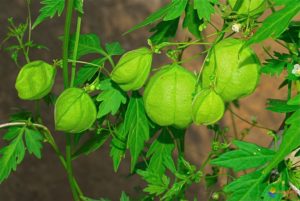


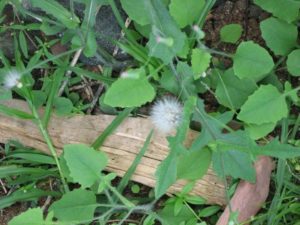


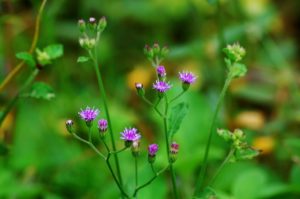
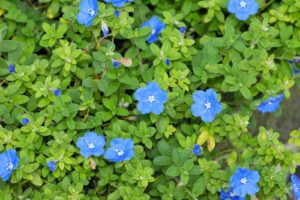




















Very helpful discription…
Really nice
Thank you
Thank you!
Thank you for describing the benefits of these wonderful plants..I’ve seen these plants at several places in Kerala, but never knew they had all these medicinal properties!